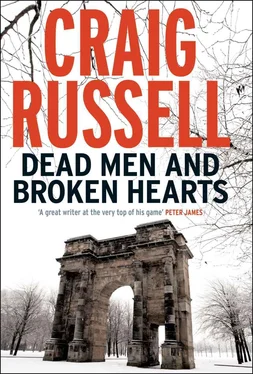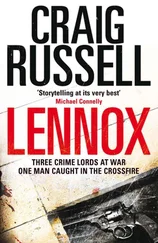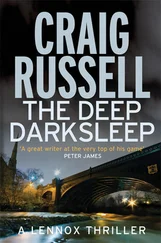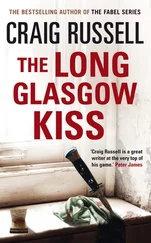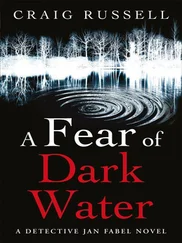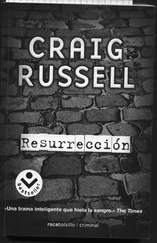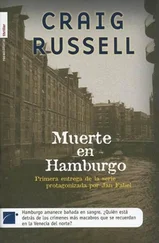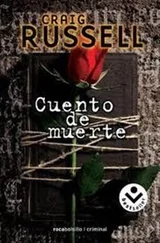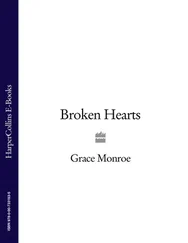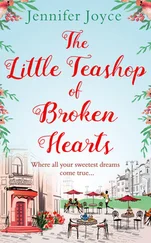Craig Russell - Dead men and broken hearts
Здесь есть возможность читать онлайн «Craig Russell - Dead men and broken hearts» весь текст электронной книги совершенно бесплатно (целиком полную версию без сокращений). В некоторых случаях можно слушать аудио, скачать через торрент в формате fb2 и присутствует краткое содержание. Жанр: Триллер, на английском языке. Описание произведения, (предисловие) а так же отзывы посетителей доступны на портале библиотеки ЛибКат.
- Название:Dead men and broken hearts
- Автор:
- Жанр:
- Год:неизвестен
- ISBN:нет данных
- Рейтинг книги:4 / 5. Голосов: 1
-
Избранное:Добавить в избранное
- Отзывы:
-
Ваша оценка:
- 80
- 1
- 2
- 3
- 4
- 5
Dead men and broken hearts: краткое содержание, описание и аннотация
Предлагаем к чтению аннотацию, описание, краткое содержание или предисловие (зависит от того, что написал сам автор книги «Dead men and broken hearts»). Если вы не нашли необходимую информацию о книге — напишите в комментариях, мы постараемся отыскать её.
Dead men and broken hearts — читать онлайн бесплатно полную книгу (весь текст) целиком
Ниже представлен текст книги, разбитый по страницам. Система сохранения места последней прочитанной страницы, позволяет с удобством читать онлайн бесплатно книгу «Dead men and broken hearts», без необходимости каждый раз заново искать на чём Вы остановились. Поставьте закладку, и сможете в любой момент перейти на страницу, на которой закончили чтение.
Интервал:
Закладка:
I nodded. The old bargee clearly loved this inanimate lump of floating wood and steel. Everyone had to have their focus, I thought, something in which they could invest pride. As I surveyed the boat, I could understand the bargee’s passion: it was a real piece of craftsmanship and smelled of polished wood and burnished brass, with paintwork that looked like it had been done that morning.
Somewhere along the line I had gotten the idea that I would be turning up to see a narrowboat. The fact was that there was no spidering network of canals in Scotland: barges operated mainly on the Forth-Clyde canal that guillotined Scotland at the neck and connected its two major cities, Glasgow and Edinburgh, or the Monklands Canal, which brought cargo from the coal mines in Lanarkshire to feed the ever-hungry industry of Glasgow. These were wider waterways than many of the canals south of the border and the craft were, correspondingly, broader.
‘She’s a widebeam,’ the bargee informed me with pride. ‘Fifty-two foot long and fourteen foot beam. Three foot six draught.’
I nodded sagely, as if any of it meant something to me.
At the back of the boat there was a balustrade-ringed deck where the helm was located: a varnished wooden wheel exposed to the elements but which allowed the bargee the clearest view in every direction. A short staircase led down from the deck to the sliding door that offered access to the living quarters, basically the back third of the boat.
It was the living quarters that surprised me the most. Obviously, it was cramped, but there was an amazing economy in the use of space. I found myself surrounded by burnished, gleaming wood.
There were a lot of things I could be accused of. Being a cynical bastard was one of them. I had sneered and laughed at the deprivations in Glasgow; at the low expectations and short stature, at the limited imagination and even more limited ambition of the city’s people. But there was one thing I had seen and seen often: what Connelly and his kind would brand as the ‘nobility of the working man’.
Sure, there were lazy bastards about, and a lot of larcenous Govan shipyard workers’ tenements that looked like they had been fitted out by the designers of the Titanic’s first class lounge, but standing in the living quarters of that barge, I saw the Scottish work ethic at its purest. Everything gleamed. Everything was in its place. Everything spoke of a man who had focused those limited ambitions and aspirations into a single, solid form.
I was tempted by the idea of renting the barge, at least for a little while, but I told the old guy that I’d other places to see and I’d get back to him about it.
The truth was that, while the barge itself had held some kind of gypsy-caravan appeal for me, its mooring had been less than romantic. It was tethered to a quay under a canopy of cranes and sat in water as black as liquid obsidian, the oil-sleeked surface shimmering with dark rainbows. The stone quay, the cranes, the water, all were black against the slate winter sky and standing there I felt sketched in charcoal.
I got the Renfrew Ferry back across the Clyde, again checking out my fellow passengers for types foreign or secretive. Driving back into town through Clydebank did little to lift my mood. The traffic, such as it was, came to a halt before I reached the city centre. A delivery cart had shed part of its load through a loose tailgate and the coal-dustingrained driver was piling sacks of coal back onto the cart between bad-temperedly directing cars past him, all the time being watched uninterestedly over its shoulder by the carthorse: a Clydesdale who looked of a vintage to have pulled cannon at Waterloo.
I wasn’t delayed for long, but just long enough to take in my surroundings. A wall of grey-black tenements flanked the roadway, tight against it and separated by the narrow ribbon of pavement. To my right was a gap: a bomb-site breach in the wall of tenement buildings, no more than a square of rough ground, which, like the tenements, was soot-dark and broken by piles of bricks, other debris, and the occasional pool of greasy rainwater.
There was a child playing on the site, a boy of no more than eight or nine who should have been at school. He wore rubber boots and a black coat that looked too thin to protect him from the damp Glasgow winter and his head was bare, a shock of ruffled red-blond the only colour in the monochrome. He was oblivious to what was going on in the street and poked at a smear of oily water with a stick, completely lost in a world of his own imagining.
I had seen so many things, so many sad or bleak or terrible things, while I’d been in Glasgow, but for some reason the sight of that small boy depressed me more than anything else. I wondered, as I watched him lost in play, if he was contemplating his future — because I sure was. And it wasn’t good. For an instant, I understood why there were so many people like Connelly and Lynch in Glasgow. Why there were so many chips on so many shoulders and why so many wanted to turn the system on its head.
The car behind sounded its horn and I looked ahead to see the toothless mouth of the carter shape something obscene as he furiously waved his arm about to indicate I could pass his cart. I drove on, but something sat heavy in my chest whenever I thought about that small boy and his lack of future.
It was then that I made a decision about my own future. A long overdue one.
CHAPTER TWENTY
As if to reinforce my decision, I drove past my digs and, sure enough, the Jowett Javelin was parked outside. White’s visits were obviously becoming more frequent and less discreet. I drove on. Decision made and confirmed.
Back in the office I sat at my desk and did a few calculations. Or re-calculations. The classified ad I had circled in the evening paper had been for a largish top floor apartment in Kelvin Court, a six-storey complex on Great Western Road. The apartment was considerably more up-scale than the places I’d looked at so far; Kelvin Court was an elegant Art Deco building that had been put up in the late Thirties. But it wasn’t the style or the size of the flat that set it apart: what had made it an unusual choice for me was that it wasn’t for rent, it was for sale. And that would mean, for the first time in ten years, putting real roots down in Glasgow.
When I had considered buying the flat, I had sat at my desk and totalled up all of the accounts and stashes I had put together since Germany, including my Nibelungengold — the little superannuation plan I’d arranged for myself in Hamburg and to which Hopkins had alluded. All together it was a tidy sum: enough to place me in the property-owning classes.
But that had been before my epiphany.
As I had sat watching that small boy play in the waste ground’s oily muck, a revelation had come to me. A revelation so clear and bright and shining, it made any received by Abraham, Moses or Mohammed look equivocal and woolly. And what had been burned into my particular stone tablet had been simple: Lennox, what the FUCK are you doing here?
Naturally, it wasn’t just the little roadside tableau that had convinced me, there was the nagging sting every time I thought about how Fiona White had rejected me for some insignificant little pen-pusher. And, of course, Canada was a long way for Hopkins to reach, although I guessed he could, if he put his mind to it.
So now, instead of calculating down-payments and mortgages for a property that would anchor me in Glasgow, or how much I could afford on a new car to drive at walking pace through the smog, I was working out how much I could mail and wire to an account in Canada, and how much it would be safe to carry on me.
I made several ’phone calls that afternoon. By the time I was finished I had the dates and prices of passage to Halifax, Nova Scotia and quotes per crate for shipping my stuff back. After the last call, I swung my captain’s chair around so I could look out of my office window at the dark graphite sky above the darker hulk of Central Station. Lighting a cigarette, despite the gloom I felt bathed in a warm light and resisted the urge to yell ‘So long, suckers!’ at the commuters bustling in and out under the ornate wrought iron of the station’s entrance canopy.
Читать дальшеИнтервал:
Закладка:
Похожие книги на «Dead men and broken hearts»
Представляем Вашему вниманию похожие книги на «Dead men and broken hearts» списком для выбора. Мы отобрали схожую по названию и смыслу литературу в надежде предоставить читателям больше вариантов отыскать новые, интересные, ещё непрочитанные произведения.
Обсуждение, отзывы о книге «Dead men and broken hearts» и просто собственные мнения читателей. Оставьте ваши комментарии, напишите, что Вы думаете о произведении, его смысле или главных героях. Укажите что конкретно понравилось, а что нет, и почему Вы так считаете.
